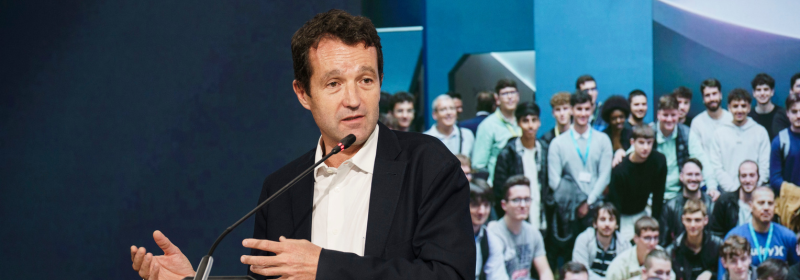- Over 100 vocational training (VT) centers and institutional representatives meet at Indra Group’s offices to address the challenges and opportunities related to technical training as a driver of innovation and employment
- One third of Indra Group’s workforce in Spain are vocational training graduates, reflecting the company’s commitment and the opportunities it provides
- It has reached agreements with 346 VT centers and it plans to incorporate 75% of the students enrolled at them in 2025 into its workforce

On Monday, Indra Group held a meeting with directors of Vocational Training (VT) centers throughout Spain, as well as representatives of the Ministry of Education, VT and Sports and the Regional Ministry of Education of the Community of Madrid. The event, held at the company’s headquarters in Alcobendas, highlighted the importance of this kind of training in strategic sectors such as defence, aerospace, and the digital technologies.
“This educational pathway opens up doors to stable and exciting careers. At Indra Group, we stand at the forefront of the reindustrialization of Spain, a key moment for the country, in the conviction that vocational training not only trains thousands of young people each year, it’s also a lever of transformation for society”, declared Ángel Escribano, Executive Chairman of Indra Group and a former vocational training student.
Currently, one third of Indra Group’s workforce in Spain are vocational training graduates, a reflection of the company’s commitment to this educational pathway as a driver of employability and competitiveness. In addition, 75% of the VT students in internships in 2025 are expected to join the company’s workforce and enhance Indra Group’s role as an engine of the domestic industrial and technological fabric. “A country seeking to develop solid industrial capabilities and real technological autonomy must make a firm commitment to vocational training, as Spain does”, argued the Executive Chairman.
Indra Group CEO José Vicente de los Mozos made a brief presentation of the company, highlighting its different lines of business and pointing to the needs that are set to arise during a period of comprehensive transformation. “Administrations, training centers and companies must work together to ensure that this transformation comes to fruition and that this moment in time serves to guarantee an excellent future for young people”.
Indra Group currently implements 346 agreements with VT centers, recalled María del Carmen Moneva, the Chief Human Resources Officer. Chief Strategy Officer Manuel Ausaverri highlighted the importance of talent in the company’s strategy and the need to foster an ecosystem based on collaboration, proximity, and shared success.
The seminar was attended by institutional leaders, who shared success stories stemming from the cooperation between companies and educational institutions. Within this context, María Luz Rodríguez de Llera, Director General of Secondary Education, Vocational Training and Special Regime, highlighted that the Community of Madrid “will also advocate public-private collaboration to promote the talent of vocational training students and facilitate the transition from the classroom to the workplace”.
For the Secretary General of Vocational Training, Esther Monterrubio, vocational education and training “is a national lever: it converts the potential of young talent into innovation that improves companies and our daily lives. In doing so, it accelerates the development of our industrial and technological capabilities,” she stated. She also emphasized that “this outcome is no coincidence” but rather “stems from the alliance between institutions, vocational training centers, and companies that share standards, responsibilities, and vision”.
The sustained growth of Spanish VT was highlighted during the seminar, with over one million students enrolled in the current academic year. Special emphasis has therefore been placed on the demand for technological profiles, the importance of dual VT, and the need to strengthen early guidance for young people.
VT, key to specialties that have become strategic
Vocational training has established itself as a vital driver of employment, particularly in strategic sectors such as industry, technology, and telecommunications. Its practical approach enables students to enter the world of employment with a solid base and practical preparation aligned with the real needs of the industry. Some kinds of training, such as dual and intensive VT, can provide direct routes to job placements; half of the vacancies published in 2024 requested VT graduates, according to a recent study conducted by Adecco. The above analysis indicates that the sector witnessing the greatest increase in hiring is industry.
In this regard, throughout the event it was underlined that vocational training is a solid and effective way of accessing leadership and innovation positions in the technology sector, in which partnerships between companies, schools and institutions are key to attracting and developing young talent in expanding areas such as defence, aerospace, artificial intelligence, and the digital technologies. The speakers agreed that the irruption of generative AI, advanced analytics and quantum computing will continue to drive the demand for technological profiles, and that confidence in talent is vital when it comes to fostering the development of organizations and competing in the global market. With initiatives in different autonomous communities (new factories, innovation centers, tech hubs, centers of excellence, etc.), Indra Group has identified other emerging areas such as space, quantum electronics, and autonomous systems in which VT can flexibly adapt to the technological demands of the current-day market.